Week in the Campo
10 abril 2007
The Campo (countryside, roughly translated). Life is supposed to be different out there, and it is, but I have to say, it wasn’t that different for me….
Day 1 (Monday 2 April) – So we all leave in our microbus out to Chalate, which is the capital of the department of Chalatenango, which is in the northern part of the country, bordering Honduras. Our final destination was the town of Arcatao, which is about 2 km from Honduras, in the mountains. We were going to take a public bus up there, but missed it, and had to wait a couple hours until the next one came. They told us that the reason we had to take the bus was that our micro would’ve bottomed out on the road too much, as the roads up there are still not the greatest (and not paved). So, we packed onto this bus, a school bus with adjusted seats (that is, pushed closer together), and as many people packed in standing as possible. Fun. We get up to Arcatao at about 1 pm, but not before a 30-minute break while they had to put more air into the tires. For the first two days, our directors told us we’d be having a retreat of sorts with youth from the area. That was on Tuesday, so on Monday we just went to the retreat center and rested for the afternoon. Padre Miguel, the Jesuit priest of the parish of Arcatao, came to talk to us, and that night after dinner with went with him to the community of Las Vegas, to join in a youth gathering there. More anti-climactic than expected, as it wasn’t really happening as Padre had said it would.
Day 2 – So, the retreat started around 9, or I mean being Salvadoran, they started at 9:30ish. There were a good number of people there, youths from all sorts of cantones (little towns around the area), with many of them walking long distances to get there. The retreat was more of a youth event than a retreat, even though we broke up at various points into small groups to discuss topics related to Holy Week. It was interesting to meet a few different youths and try to get an idea of what was life there. In talking with Padre Miguel, he told me that they have very few options there. So many youths from that area are migrating to the States, as education past grade school is very difficult in most cases. You may have to walk an hour to get to high school in the city, if you can pay for it, and if your family situation doesn’t require you to start working when you can—sometime in grade school. He told me that many of them really have no financial means, just like their family, but it’s especially poignant for the lack of diversion, of ways to have fun. Many play soccer, if they have shoes with which to play. It’s a very static lifestyle, which I imagine to be extremely difficult for youths hearing about and seeing a little of the outside world’s culture of consumerism. Hell, even just realizing what they don’t have relative to many of their peers around the world.
That night, we went to a prayer vigil for the deceased brother of one of the becarias (scholarship students) who lives in Casa Ita (one of our three houses). He died a few years ago from gang violence on a bus, in a very nasty way. I’ve only heard part of the story, but it seemed very tragic, especially for a family from the campo. Well, it took us an hour in pickup truck to get out there to her house, and the service was about an hour long. There were a lot of people packed into their house, and many of us just stayed outside the room in support. It was a shame that I got some pretty terrible intestinal cramps while I was there, which spoiled the experience. But that’s part of the price you pay for life in Salvador—and it’s not just us foreigners who get these intestinal problems too (you often see bulletins everywhere about what to do when you get diarrhea, as it’s still a major cause of death for many babies here). The water is just that bad, it really is.
Day 3 – So everyone headed out to their families in the morning, except for me pretty much. So here’s how it is supposed to work: each person is paired with another student, and the pair gets placed with a family in a community, no more than one pair per community. Ray, one of our assistant directors, takes care of all of it beforehand with Padre Miguel, but of course, everything doesn’t work out as cleanly as hoped. Oftentimes, Padre Miguel will change things last minute or a community or a family will request things, so that morning some people’s communities even changed. Frustrating. The night before, Ray came up and talked to my partner, Adam, and I, and he said that they needed to split us up. Wow, this was a great thing for Adam and me, as we’re both fairly independent and have a good degree of Spanish, with a less-likely chance of having a breakdown from being alone. That morning, everyone left except for Adam, me, and a pair of women from our group. I continued to have intestinal difficulties, so while I was in the bathroom, Adam headed out to one of the families with whom we had the option to stay. Padre Miguel told me to leave my stuff at the Parish and to come with him, as I would be his compañero for the day. Yeah, I just tooled around with him: we dropped off two pairs of students at their families, ate lunch at the Parish with two other visiting Jesuits, went to two reconciliation services in the afternoon, and finally ate dinner with just Padre before heading out to my family at 7 pm. The reconciliation services were disheartening, really. The first one was okay, small with a lot of singing. The second one, larger, was just frustrating. While Padre was outside hearing confessions, the people inside for mostly just talking amongst themselves or trying to control their terribly-behaved children. There was a choir singing, but most of the congregation chose not to sing. At least that service was in the community of a pair of students, so I sat by them, just nice to see a familiar face. Finally, at the parish, the oldest son of my host family came to pick me up.
When I arrived at their house, I discovered that I was in the town of Arcatao, proper, instead of being out in a cantón—two blocks from the church. The family goes as such: Dad, a carpenter, Agustín; Mom, a teacher, Dominga; older son, Tomás, age 17; daughter, Silvia, age 15; younger son, Kique (Enrique), age 13. All three were still in school, and it is Tomás’s last year of high school, with hopes of going next year to University. I feel that he will. The family is fairly well-off for the campo, as they had extra beds, a fridge, a tv with antenna, a toilet, a shower, and the kicker, a computer with internet. We had been prepared before the trip for no electricity, no showers, no toilets (perhaps an outhouse), and perhaps not enough beds, with a family of many kids and parents who worked their own subsistence farming plot. Well, to say the least, I was not expecting this. The dad had all the tools he would need for carpentry, including big table saws, circular saws, and sanders. Anyway, that night most of the family went to the reconciliation service at the church in Arcatao, leaving me at home with Tomás. We actually ended up talking a little, and I helped him with his English homework for class. He didn’t really want help in terms of just giving him answers—what he really needed was pronunciation. It hit me just how poorly taught his class was, as they were forging along regardless of the students’ learning anything.
Day 4 Holy Thursday – That morning, they were still working. I helped Augustín with his carpentry, as they were making wooden rifles for the re-enactment of the Río Sumpul Masacre, which was a horrendous massacre of people from that region by the army during the war, in which a large river of theirs turned red from all the blood. It was very strange to be making guns for that reason in such an environment, as I had to ask the veterans who were there working if my design was realistic enough. Just a striking action.
That afternoon, like much of the time there, I just relaxed and read, while asking to help in whatever way I could. Because they were “on vacation,” there was really nothing I could do besides offer to do the dishes and help in the kitchen. Throughout the week, I helped make pupusas and tortillas, and I did the dishes a lot. I got the comment that men often don’t like to make pupusas and tortillas, and during a table discussion, my host father, only partially-joking, said because it’s women’s work. The machismo takes on a whole different life in the campo, not really as abusive and vocal in the streets, but generally just reinforcing the gender roles. The men work, the women do all the house work and take care of the kids. That’s how it is. My family wasn’t as bad as some stories I’ve heard, of the father just sitting there in the house the whole time while the wife works constantly, but my host father didn’t really jump up to do the dishes. He could cook, and each family member did their own laundry. The kids cleaned the house a lot, instead of the mother doing all the work. It helps that the mother is educated and has a job outside of the house, which forces the father to be more involved and the male children to get off their rumps. One good thing about the week was that I was able to finish my book for lit class, Un Día en la Vida (A Day in the Life), which is basically about the military repression before and during the war through the eyes of a campesina. Very fitting reading for the week.
That night, we went to Mass. The family is very active in the church, mainly through music. The mother leads the choir, Tomás (the oldest son) plays guitar, and Silvia sings. The father just kind of sits there and plays the tambourine. The mother has been very active for a while now, even going with a church delegation back in the early nineties to a sister parish in Seattle.
Now, I’ll just give some highlights about the rest of the week along with some observations. We had a Stations of the Cross on Thursday, at about the hottest point during the day, at 11 pm for an hour and half to the church (outside, on the streets). This time, the youths included a theatrical interpretation of some of the stations, which was quite good. The Good Friday service features a washing of the feet, which took on a new spin in this setting, as they had multiple examples of societal roles washing each other’s feet (student/teacher, parent/child, husband/wife, young person/old person, etc.). We went on a process on Good Friday later that night, which was the longest thing I’ve ever marched in, and yes, the slowest. Evidently the tradition there is just to walk pretty much as slow as possible. Saturday evening is the resurrection service, instead of Sunday for many of us in the States, which was different. Padre arrived very late, at 10:45 instead of 10, from another service. So we didn’t get out until after midnight. However, after that, we had the burning of Judas, which isn’t technically a church sanctioned event, though it’s tradition. A man with a life-sized effigy of Judas danced around the main square of town to a mariachi band, until they finally strung him up and lit him on fire, as children beat the flaming corpse as if it were a piñata. Very strange. We had many discussions amongst ourselves, as about 6 of us in the Program usually arrived in town for the services (as well as our directors), about the faith life of the people there. By Saturday night, everyone was very tired. There had been a lot of processions and masses and events, so during the Resurrection service children were sprawled out on the pews, people were sleeping on the backrest in front of them, and the only people paying attention were basically the old ladies. The Sunday service was pretty lackluster, as evidently the big thing occurred the night before. I expected it to be so much happier, a lot of singing and praise and just general gladness. The people just looked tired and beaten, and I expected the joy of Easter and the coming of Christ to be a great moment and joyful break from the mainly-static lives of many campesinos. A lot of what happened lacked great faith and real theological underpinnings. My friends who went on the silent procession one evening after a service told me that it really wasn’t silent, that people just started talking. The processions were supposed to have singing, and most of the people didn’t really care. Many of the events seemed like people were just coming more as a community activity, a social-event of sorts.
The family didn’t really taking much of an interest to me, which was sad for the whole experience. They really just led me around and didn’t feel like introducing me to people their knew and people who came into the house or whom they saw on the street. I was the awkward elephant in the room who everyone saw as not belonging but whom no one felt like addressing. Very frustrating, as there’s only so much you can do from a visitor’s standpoint. We went to the river twice to bathe, and there were a lot of people there, especially families. There was a natural water slide and a 10-15 foot jump into deep water that was fun, I must say. In the end, the goodbyes were awkward and the family didn’t seem to care, but oh well. I did have a good talk with the mother the last night about her and the family’s life and what they did during the war. Strangely, some of my companions echoed the same sentiment about not being integrated into the family very well and the family not introducing them. We have reflection tonight about it, so we’ll hear more about what everyone’s experience was like.
Usually, the week in the campo for the program does not fall on Semana Santa. This year, they gave it a try, as it fit into the schedule and would be an interesting opportunity to see this all-important week from the eyes of the campesino. The only problem would be that this is a vacation week for most people, as they’re not working for much of it; so we wouldn’t be able to help out with their farming or other house chores.
Italian food for dinner last night. This place is awesome, really. I spent about four hours in there the other day, skipping lunch at the house, instead going for a good espresso, homemade pizza, and a glass of Italian red while studying for our sociology midterm. I took a big group there last night, and I thoroughly enjoyed the gnocchi and his house red. The place is owned by this Italian man from outside Rome and his Salvadoran (we think?) wife. His red wine is some house red, made in his town outside Rome (we agreed that he’d never stoop to the level of getting Chilean or Argentinean wine, as it’s the cheapest and best stuff easily attainable here), and they make all their cookies, bread, and pasta in house. The pizzas are all made from scratch, and the espresso is damn good. It’s a lovely change from Salvadoran food, if you need a little boost of the world outside here every now and then. Makes me really happy, I must say. Miss that life and that food, though, a lot more than I had expected I would.
Salvador continues to be difficult, a challenging experience, especially after my time in Europe. I thought two very different semesters would give me a broad view of the world, which they have, but I didn’t expect them to pull me in seemingly different directions. I still have a lot of soul-searching to do, and this is a good place to do it. Another month, the last month, here we go!
Loving and missing everyone,
Anthony
The Campo (countryside, roughly translated). Life is supposed to be different out there, and it is, but I have to say, it wasn’t that different for me….
Day 1 (Monday 2 April) – So we all leave in our microbus out to Chalate, which is the capital of the department of Chalatenango, which is in the northern part of the country, bordering Honduras. Our final destination was the town of Arcatao, which is about 2 km from Honduras, in the mountains. We were going to take a public bus up there, but missed it, and had to wait a couple hours until the next one came. They told us that the reason we had to take the bus was that our micro would’ve bottomed out on the road too much, as the roads up there are still not the greatest (and not paved). So, we packed onto this bus, a school bus with adjusted seats (that is, pushed closer together), and as many people packed in standing as possible. Fun. We get up to Arcatao at about 1 pm, but not before a 30-minute break while they had to put more air into the tires. For the first two days, our directors told us we’d be having a retreat of sorts with youth from the area. That was on Tuesday, so on Monday we just went to the retreat center and rested for the afternoon. Padre Miguel, the Jesuit priest of the parish of Arcatao, came to talk to us, and that night after dinner with went with him to the community of Las Vegas, to join in a youth gathering there. More anti-climactic than expected, as it wasn’t really happening as Padre had said it would.
Day 2 – So, the retreat started around 9, or I mean being Salvadoran, they started at 9:30ish. There were a good number of people there, youths from all sorts of cantones (little towns around the area), with many of them walking long distances to get there. The retreat was more of a youth event than a retreat, even though we broke up at various points into small groups to discuss topics related to Holy Week. It was interesting to meet a few different youths and try to get an idea of what was life there. In talking with Padre Miguel, he told me that they have very few options there. So many youths from that area are migrating to the States, as education past grade school is very difficult in most cases. You may have to walk an hour to get to high school in the city, if you can pay for it, and if your family situation doesn’t require you to start working when you can—sometime in grade school. He told me that many of them really have no financial means, just like their family, but it’s especially poignant for the lack of diversion, of ways to have fun. Many play soccer, if they have shoes with which to play. It’s a very static lifestyle, which I imagine to be extremely difficult for youths hearing about and seeing a little of the outside world’s culture of consumerism. Hell, even just realizing what they don’t have relative to many of their peers around the world.
That night, we went to a prayer vigil for the deceased brother of one of the becarias (scholarship students) who lives in Casa Ita (one of our three houses). He died a few years ago from gang violence on a bus, in a very nasty way. I’ve only heard part of the story, but it seemed very tragic, especially for a family from the campo. Well, it took us an hour in pickup truck to get out there to her house, and the service was about an hour long. There were a lot of people packed into their house, and many of us just stayed outside the room in support. It was a shame that I got some pretty terrible intestinal cramps while I was there, which spoiled the experience. But that’s part of the price you pay for life in Salvador—and it’s not just us foreigners who get these intestinal problems too (you often see bulletins everywhere about what to do when you get diarrhea, as it’s still a major cause of death for many babies here). The water is just that bad, it really is.
Day 3 – So everyone headed out to their families in the morning, except for me pretty much. So here’s how it is supposed to work: each person is paired with another student, and the pair gets placed with a family in a community, no more than one pair per community. Ray, one of our assistant directors, takes care of all of it beforehand with Padre Miguel, but of course, everything doesn’t work out as cleanly as hoped. Oftentimes, Padre Miguel will change things last minute or a community or a family will request things, so that morning some people’s communities even changed. Frustrating. The night before, Ray came up and talked to my partner, Adam, and I, and he said that they needed to split us up. Wow, this was a great thing for Adam and me, as we’re both fairly independent and have a good degree of Spanish, with a less-likely chance of having a breakdown from being alone. That morning, everyone left except for Adam, me, and a pair of women from our group. I continued to have intestinal difficulties, so while I was in the bathroom, Adam headed out to one of the families with whom we had the option to stay. Padre Miguel told me to leave my stuff at the Parish and to come with him, as I would be his compañero for the day. Yeah, I just tooled around with him: we dropped off two pairs of students at their families, ate lunch at the Parish with two other visiting Jesuits, went to two reconciliation services in the afternoon, and finally ate dinner with just Padre before heading out to my family at 7 pm. The reconciliation services were disheartening, really. The first one was okay, small with a lot of singing. The second one, larger, was just frustrating. While Padre was outside hearing confessions, the people inside for mostly just talking amongst themselves or trying to control their terribly-behaved children. There was a choir singing, but most of the congregation chose not to sing. At least that service was in the community of a pair of students, so I sat by them, just nice to see a familiar face. Finally, at the parish, the oldest son of my host family came to pick me up.
When I arrived at their house, I discovered that I was in the town of Arcatao, proper, instead of being out in a cantón—two blocks from the church. The family goes as such: Dad, a carpenter, Agustín; Mom, a teacher, Dominga; older son, Tomás, age 17; daughter, Silvia, age 15; younger son, Kique (Enrique), age 13. All three were still in school, and it is Tomás’s last year of high school, with hopes of going next year to University. I feel that he will. The family is fairly well-off for the campo, as they had extra beds, a fridge, a tv with antenna, a toilet, a shower, and the kicker, a computer with internet. We had been prepared before the trip for no electricity, no showers, no toilets (perhaps an outhouse), and perhaps not enough beds, with a family of many kids and parents who worked their own subsistence farming plot. Well, to say the least, I was not expecting this. The dad had all the tools he would need for carpentry, including big table saws, circular saws, and sanders. Anyway, that night most of the family went to the reconciliation service at the church in Arcatao, leaving me at home with Tomás. We actually ended up talking a little, and I helped him with his English homework for class. He didn’t really want help in terms of just giving him answers—what he really needed was pronunciation. It hit me just how poorly taught his class was, as they were forging along regardless of the students’ learning anything.
Day 4 Holy Thursday – That morning, they were still working. I helped Augustín with his carpentry, as they were making wooden rifles for the re-enactment of the Río Sumpul Masacre, which was a horrendous massacre of people from that region by the army during the war, in which a large river of theirs turned red from all the blood. It was very strange to be making guns for that reason in such an environment, as I had to ask the veterans who were there working if my design was realistic enough. Just a striking action.
That afternoon, like much of the time there, I just relaxed and read, while asking to help in whatever way I could. Because they were “on vacation,” there was really nothing I could do besides offer to do the dishes and help in the kitchen. Throughout the week, I helped make pupusas and tortillas, and I did the dishes a lot. I got the comment that men often don’t like to make pupusas and tortillas, and during a table discussion, my host father, only partially-joking, said because it’s women’s work. The machismo takes on a whole different life in the campo, not really as abusive and vocal in the streets, but generally just reinforcing the gender roles. The men work, the women do all the house work and take care of the kids. That’s how it is. My family wasn’t as bad as some stories I’ve heard, of the father just sitting there in the house the whole time while the wife works constantly, but my host father didn’t really jump up to do the dishes. He could cook, and each family member did their own laundry. The kids cleaned the house a lot, instead of the mother doing all the work. It helps that the mother is educated and has a job outside of the house, which forces the father to be more involved and the male children to get off their rumps. One good thing about the week was that I was able to finish my book for lit class, Un Día en la Vida (A Day in the Life), which is basically about the military repression before and during the war through the eyes of a campesina. Very fitting reading for the week.
That night, we went to Mass. The family is very active in the church, mainly through music. The mother leads the choir, Tomás (the oldest son) plays guitar, and Silvia sings. The father just kind of sits there and plays the tambourine. The mother has been very active for a while now, even going with a church delegation back in the early nineties to a sister parish in Seattle.
Now, I’ll just give some highlights about the rest of the week along with some observations. We had a Stations of the Cross on Thursday, at about the hottest point during the day, at 11 pm for an hour and half to the church (outside, on the streets). This time, the youths included a theatrical interpretation of some of the stations, which was quite good. The Good Friday service features a washing of the feet, which took on a new spin in this setting, as they had multiple examples of societal roles washing each other’s feet (student/teacher, parent/child, husband/wife, young person/old person, etc.). We went on a process on Good Friday later that night, which was the longest thing I’ve ever marched in, and yes, the slowest. Evidently the tradition there is just to walk pretty much as slow as possible. Saturday evening is the resurrection service, instead of Sunday for many of us in the States, which was different. Padre arrived very late, at 10:45 instead of 10, from another service. So we didn’t get out until after midnight. However, after that, we had the burning of Judas, which isn’t technically a church sanctioned event, though it’s tradition. A man with a life-sized effigy of Judas danced around the main square of town to a mariachi band, until they finally strung him up and lit him on fire, as children beat the flaming corpse as if it were a piñata. Very strange. We had many discussions amongst ourselves, as about 6 of us in the Program usually arrived in town for the services (as well as our directors), about the faith life of the people there. By Saturday night, everyone was very tired. There had been a lot of processions and masses and events, so during the Resurrection service children were sprawled out on the pews, people were sleeping on the backrest in front of them, and the only people paying attention were basically the old ladies. The Sunday service was pretty lackluster, as evidently the big thing occurred the night before. I expected it to be so much happier, a lot of singing and praise and just general gladness. The people just looked tired and beaten, and I expected the joy of Easter and the coming of Christ to be a great moment and joyful break from the mainly-static lives of many campesinos. A lot of what happened lacked great faith and real theological underpinnings. My friends who went on the silent procession one evening after a service told me that it really wasn’t silent, that people just started talking. The processions were supposed to have singing, and most of the people didn’t really care. Many of the events seemed like people were just coming more as a community activity, a social-event of sorts.
The family didn’t really taking much of an interest to me, which was sad for the whole experience. They really just led me around and didn’t feel like introducing me to people their knew and people who came into the house or whom they saw on the street. I was the awkward elephant in the room who everyone saw as not belonging but whom no one felt like addressing. Very frustrating, as there’s only so much you can do from a visitor’s standpoint. We went to the river twice to bathe, and there were a lot of people there, especially families. There was a natural water slide and a 10-15 foot jump into deep water that was fun, I must say. In the end, the goodbyes were awkward and the family didn’t seem to care, but oh well. I did have a good talk with the mother the last night about her and the family’s life and what they did during the war. Strangely, some of my companions echoed the same sentiment about not being integrated into the family very well and the family not introducing them. We have reflection tonight about it, so we’ll hear more about what everyone’s experience was like.
Usually, the week in the campo for the program does not fall on Semana Santa. This year, they gave it a try, as it fit into the schedule and would be an interesting opportunity to see this all-important week from the eyes of the campesino. The only problem would be that this is a vacation week for most people, as they’re not working for much of it; so we wouldn’t be able to help out with their farming or other house chores.
Italian food for dinner last night. This place is awesome, really. I spent about four hours in there the other day, skipping lunch at the house, instead going for a good espresso, homemade pizza, and a glass of Italian red while studying for our sociology midterm. I took a big group there last night, and I thoroughly enjoyed the gnocchi and his house red. The place is owned by this Italian man from outside Rome and his Salvadoran (we think?) wife. His red wine is some house red, made in his town outside Rome (we agreed that he’d never stoop to the level of getting Chilean or Argentinean wine, as it’s the cheapest and best stuff easily attainable here), and they make all their cookies, bread, and pasta in house. The pizzas are all made from scratch, and the espresso is damn good. It’s a lovely change from Salvadoran food, if you need a little boost of the world outside here every now and then. Makes me really happy, I must say. Miss that life and that food, though, a lot more than I had expected I would.
Salvador continues to be difficult, a challenging experience, especially after my time in Europe. I thought two very different semesters would give me a broad view of the world, which they have, but I didn’t expect them to pull me in seemingly different directions. I still have a lot of soul-searching to do, and this is a good place to do it. Another month, the last month, here we go!
Loving and missing everyone,
Anthony
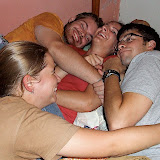
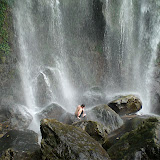
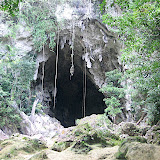
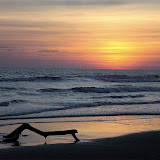
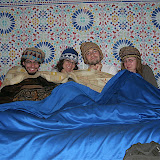
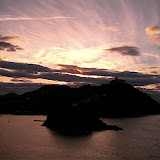
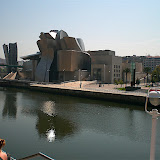

0 Comments:
Post a Comment
<< Home